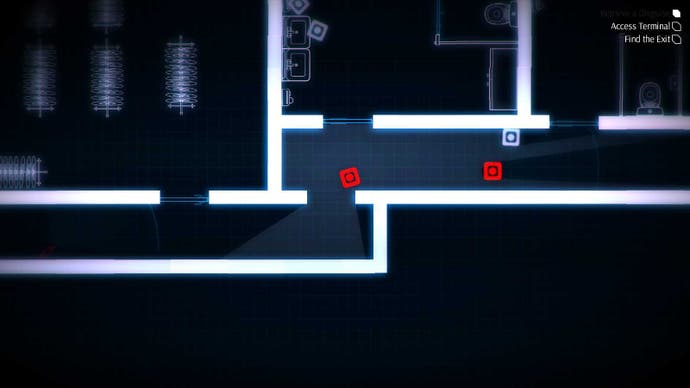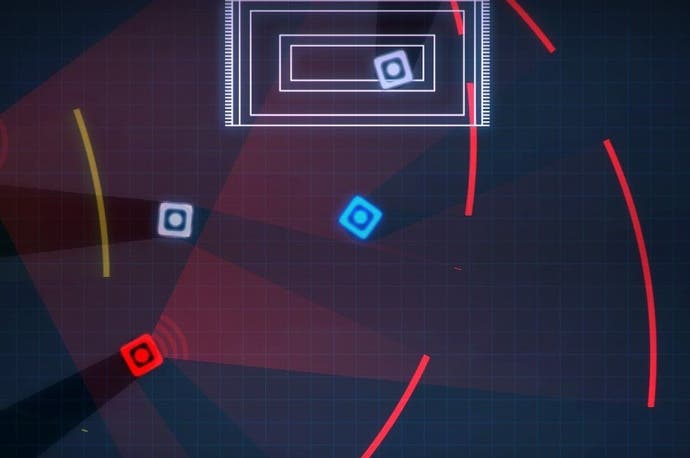Light review
Turn off.
Amnesia is one of the most common storytelling contrivances in media. It's always struck me as odd and reductionist: if you were to lose all of your old memories, would you still be you? It's a tough question, but it's one that Light tosses away almost immediately. We see the classic amnesia trope, but only through several layers of abstraction.
In Light, people are boxes, rooms and furniture are vague outlines and murder is little more than a blip on the screen. Light tries to use that distance to weave a tale of corporate conspiracy and high-stakes espionage, but that emotional gap between you and your avatar results in little more than a sterile, albeit pretty, adventure.
Light opens with you as a blue square in a room. No memories, no explanation of who you are or why you're there. Everything around you is a faded, twitchy electric blue, almost as if you were trapped in cyberspace. Across the room is your first clue: a pulsing, glowing, yellow-orange newspaper. Reading it sets you off to kill, steal and sneak your way through corporate security to uncover the truth of your own past.
It sounds like a hackneyed set-up, and that's because it is. Making it worse is that relating to a blue box isn't easy without even so much as a melodic motif to flesh out your special little square. Light's tale is told with just words and some rough-cut play. That's not to say that text or even mediocre gameplay can't make for a compelling narrative, but they're certainly not enough to make up for Light's litany of clichés.

Stealth is one of the hardest genres to get right. If everything works just so, then gameplay closely resembles a series of interlocking puzzles that encourage exploration and creative problem-solving, while discouraging the short and easy play styles most video games run us through. Thinking back to the best scenes of Metal Gear Solid or the early Splinter Cell games, it's the dynamic nature of play - the minute-to-minute tension created by the fear of being discovered - that drives them. That can only effectively be accomplished by extremely precise controls. From the first few moments, Light makes it clear that even with its developers' minimalist leanings, it can't stand with other, better-crafted games.
Controlling your little box feels like trying to dance while a bit too drunk. You know all the moves and where your feet are supposed to go, but your mind's a bit too sluggish to make it all work seamlessly. Your box drifts a bit when moving; it's not a lot, but it kept me from having a good sense of my weight and limitations. Doors will also automatically open when you're within a certain range, and the combination of the two can lead to unintentionally catching the eyes of roaming guards. Effective stealth is predicated on feeling where your character's body is, how visible you are and how you're moving through the spaces around you. Light fails to bring that sense of closeness and control, and in so doing fails to make its minimal approach feel anything more than haphazard.

Perhaps worse is the game's handling of motivations. Killing is not only possible but extremely easy in Light. Offing an enemy box is as simple as tapping the spacebar. If you're in their sights for just a bit too long, you'll go down just as quickly. The easy way to play is by rushing through, killing your enemies and grabbing intelligence. Light tries to discourage this with the extrinsic motivation of a higher score for no-kill runs, but its play is at odds with its message. Killing your pursuers is great fun, as it amounts to super-quick and highly lethal games of tag. Trying to circle around to the back of an unwary foe and hoping that your moves are just fast enough to pull it off is a lot more interesting than anything else Light has to offer - but outside of two missions, that's not what you're supposed to do.
You're supposed to minimise the loss of life. You're supposed to be the good guy, striking back at an evil corporation that's taken your life away. Instead, those extrinsic motivators clash with the intrinsic motivation to make the most of this bland, flaccid romp.
Light should be better than it is, but it was doomed from the start. Very few great stories have come from such an uninspired setting, and hiding all empathy and humanity behind a haughty desire for a slick minimalism doesn't help. Light is admirable insofar as its visuals and music create a sharp world with a brilliant artificiality about it. That works, in a way, with its narrative, but it can't stop the whole thing from being just plain boring. You go where you're told and do what you're told even while you're told that the thing you want most is your own freedom. It doesn't make sense on any level.

